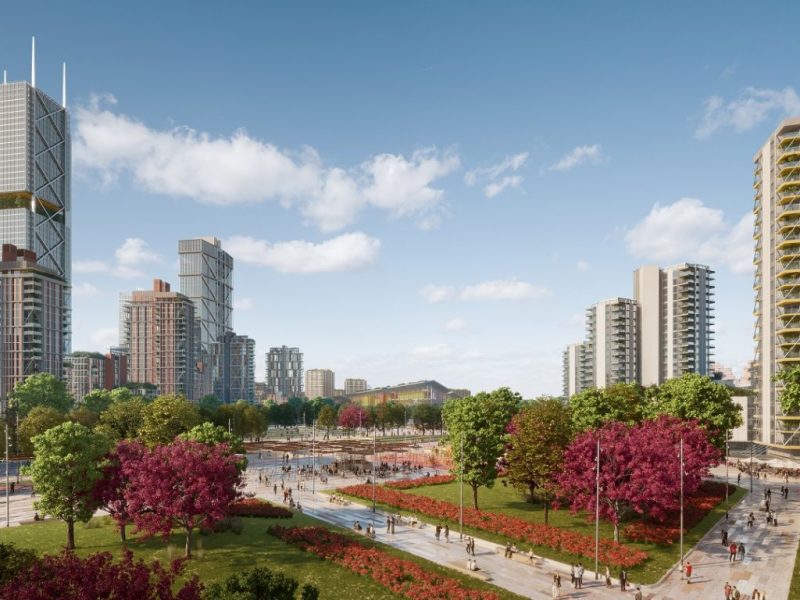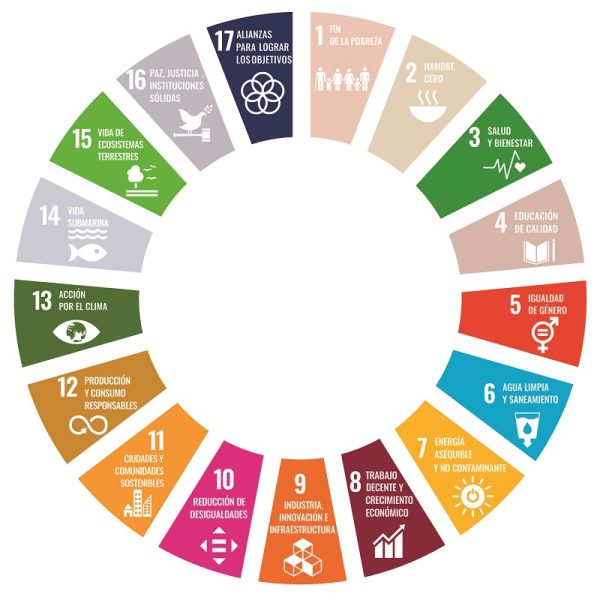20 April 2020
for Madrid Nuevo Norte


In 2015, the UN General Assembly adopted the 2030 Agenda for Sustainable Development, a global action plan for prosperity for the planet and its people that is now an undisputed benchmark. The UN sets out in this document 17 Sustainable Development Goals (SDG) to tackle critical challenges to a more liveable future. It encompasses environmental, economic and social development goals with specific targets in each area which must be achieved within the next 15 years. Therefore, it is a roadmap for governments, private sector and civil society to act responsibly for their effective achievement.
Madrid Nuevo Norte, Madrid’s major urban regeneration project, has placed sustainability at the core of its planning and, therefore, the project is guided by the 2030 Agenda. The plan addresses 12 SDGs or, in other words, contains proposals for all aspects of the international roadmap that may be applied to the project.
Madrid Nuevo Norte has focused in particular on 4 of the 12 SDGs it considers critical and more likely to have an impact on urban design: Water and Sanitation Management (SDG 6), Use of Clean Energy (SDG 7), Sustainable Urban Environment (SDG 11) and Climate Action (SDG 13). Details of how the UN Agenda is being applied to Madrid Nuevo Norte can be found below.

The SDG 3 seeks to “ensure healthy lives and promote well-being for all at all ages”. One target under this goal calls for reducing deaths from non-communicable diseases, such as heart disease or cancer. This type of diseases account for 71% of deaths worldwide each year, according to the UN. The document emphasises, amongst other things, the importance of these measures to achieve cleaner air and prevent a sedentary lifestyle.
Madrid Nuevo Norte has focused on creating attractive streets and squares with a bioclimatic design with pleasant, wind-sheltered areas of sun and shade to encourage urban life, outdoor activities in public spaces and socialisation. The public transport network and mobility by walking and cycling not only provides an incentive for daily physical activity but also improves air quality and reduces ambient noise
]The 2030 Agenda seeks to “achieve gender equality and empower all women and girls”. One key target of this SDG is to adopt and strengthen effective policies for promoting gender equality.
Madrid Nuevo Norte has been a pioneer in arguing for this target in urban development, given that it is the first major project in Spain that included a gender study from the outset. This study focuses on measures to reduce gender gaps in mobility, security and access to facilities, as well as reducing inequality in access to public spaces, through designs that encourage inclusive relationships and coexistence. To that end, it has worked closely with the UNESCO Chair of Gender in Science, Technology and Innovation at the Madrid Polytechnic University.
The UN stresses the importance of water in SDG 6, which seeks to “ensure availability and sustainable management of water and sanitation for all”. Efficient use of water resources, integrated water management and wastewater treatment are some of the issues on which the roadmap focuses.
Madrid Nuevo Norte has attached particular importance to water supply and management, implementing measures for its reuse, and improving the water efficiency of buildings and infrastructures, amongst other initiatives. The project includes city-scale, sustainable drainage systems for capture, retention and infiltration, as well as for the recovery and storage of run-off and greywater for irrigation.
It will also build a new reclaimed water network for watering public green spaces and street cleaning. Thirteen kilometres of Canal de Isabel II mains, which supplies 80% of Madrid’s drinking water, will be renovated through Madrid Nuevo Norte.
The SDG 7 calls for ensuring “access to affordable, reliable, sustainable and modern energy for all”. Some key aspects of this goal are enhanced energy efficiency, decrease in consumption and widespread use of renewable energy.
These goals are implemented in Madrid Nuevo Norte through a progressively de-carbonised energy system and production of renewable energies beyond and above building regulations. The measures planned in the project include the use of sustainable electric transport versus fossil fuel-based transport and construction of buildings with energy efficiency requirements higher than those for nearly zero-energy buildings (private buildings will generate twice as much renewable energy and public buildings up to four-times more). The use of district heating and cooling systems is also under consideration. This would produce significant savings and more rational management.
The United Nations highlights in SDG 8 the importance of promoting “sustained, inclusive and sustainable economic growth, full and productive employment and decent work for all”. The agenda encourages diversification, technological modernisation and innovation, calls for investment in high added-value economic sectors and highlights the importance of innovation, as well as the role of small and medium-sized enterprises.
Madrid Nuevo Norte’s urban model promotes sustainable economic growth and, ultimately, a modern CBD to foster innovation and the knowledge economy. It is also firmly committed to local shops and businesses with commercial premises available at ground level in 90% of the blocks.
Madrid Nuevo Norte is expected to create 118,000 jobs during the urban development and construction phase, and an additional 130,000 jobs from tertiary activity in the new neighbourhood.
SDG 9 seeks to “build resilient infrastructure, promote inclusive and sustainable industrialisation and foster innovation”. Some targets under this SDG are developing quality, reliable, sustainable and resilient infrastructures, including regional infrastructures, support technology development, research and innovation and increase access to information and communications technology.
Madrid Nuevo Norte has designed innovative, resilient infrastructures based on the digital infrastructure concept and implementation of smart city measures to optimise management and make citizens’ life easier. Moreover, the project is exploring new forms of smart mobility and urban logistics, in particular, in the so-called last-mile delivery.
One of the targets included in the United Nation’s SDG 10 is to empower and promote “the social, economic and political inclusion of all, irrespective of age, sex, disability, race, ethnicity, origin, religion or economic or other status”.
The UN calls for measures to ensure equal opportunities. Madrid Nuevo Norte also incorporates this concept through inclusive urban development. The project includes both affordable houses and residential land for public housing. It has, amongst other measures, designed and allotted land for public spaces and public infrastructures to cover the needs of future residents, as well as those of current residents in adjacent neighbourhoods.
SDG 11, “make cities and communities sustainable”, aligns squarely with Madrid Nuevo Norte’s main priorities: “Make cities and human settlements inclusive, safe, resilient and sustainable”.
Madrid Nuevo Norte develops a dense, compact and mixed-uses urban model, where public transport plays a prominent role. It includes a network of public green areas and spaces designed to ensure the general well-being of people. It seeks to make the city more sustainable through the efficient use of available renewable resources. The project has encouraged public engagement in the design phase and the responsible use of the city. To name but one of an over-long list of implemented measures, a comprehensive plan to mitigate the impact of the works during the urban development phase has been implemented.
The United Nations proposes in SDG 12 to “ensure sustainable consumption and production patterns”. This includes sustainable management and efficient use of natural resources and reducing waste generation through prevention, reduction, recycling and reuse. The 2030 Agenda calls on enterprises to adopt sustainable practices and integrate this information into their reporting cycle.
MADRID NUEVO NORTE has taken measures to reduce consumption of resources, starting with water management and energy consumption, as well as enhanced management thereof. Indeed, the project envisages responsible selection of construction and urban development materials, as well as recycling and reuse of on-site materials.
Climate change is a significant challenge moving forward. The United Nations highlights the need to “take urgent action to combat climate change and its impacts” in SDG 13.
The measures implemented by Madrid Nuevo Norte to address the climate crisis cover several areas, ranging from naturalisation of the urban environment to absorb carbon dioxide to heat island mitigation techniques (increased temperatures in public spaces due to unwanted microclimates) using appropriate materials, vegetation, shade elements and enhanced thermal comfort. Reducing fossil fuel-based transport is another measure to combat climate change. An estimated 80% of commutes in Madrid Nuevo Norte will be by sustainable transport.
SDG 15 calls for measures to “sustainably manage forests, combat desertification, and halt and reverse land degradation and halt biodiversity loss”.
Madrid Nuevo Norte not only will create quality green areas, such as the Central Park or the green axis, but will also adopt measures to promote urban biodiversity using plant species adapted to Madrid’s climate, type of water and growth rates. The project will connect different ecosystems such as the Cuenca Alta del Manzanares Regional Park, bordering Madrid Nuevo Norte, with existing urban parks in northern Madrid, through a linear network of interconnected parks and environmental connecting structures over the train tracks. Not only would this preserve and respect current ecological values, but would also create its own ecosystem to foster biodiversity.
Through SDG 17, the UN seeks to “build multi-stakeholder partnerships to mobilise and exchange knowledge, expertise, technology and financial resources to achieve the sustainable goals”. The 2030 Agenda appeals for these agreements to be promoted in the public and public-private domain, as well as in civil society.
In this respect, Madrid Nuevo Norte is an example of a public-private partnership to achieve a responsible urban model together with the public administrations and private sector support. Civil society has also rallied in favour of this project, with over 80 associations and groups and more than 170.000 citizens supporting the initiative.